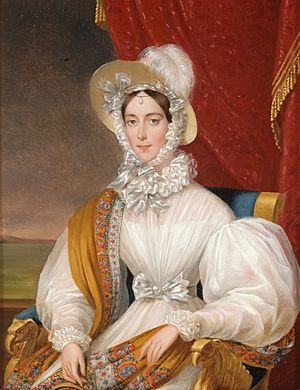Maria Anna of Savoy facts for kids
Quick facts for kids Maria Anna of Savoy |
|||||
|---|---|---|---|---|---|

Portrait by Johann Ender
|
|||||
| Empress consort of Austria Queen consort of Hungary (more...) |
|||||
| Tenure | 2 March 1835 – 2 December 1848 | ||||
| Coronation | 12 September 1836, Prague | ||||
| Born | 19 September 1803 Palazzo Colonna, Rome, Papal States |
||||
| Died | 4 May 1884 (aged 80) Prague Castle, Prague, Austria-Hungary |
||||
| Burial | Imperial Crypt, Vienna | ||||
| Spouse | Ferdinand I of Austria (m. 1831; died 1875) |
||||
|
|||||
| House | Savoy | ||||
| Father | Victor Emmanuel I of Sardinia | ||||
| Mother | Maria Theresa of Austria-Este | ||||
Maria Anna of Savoy (born September 19, 1803 – died May 4, 1884) was an important royal figure. She became the Empress of Austria and Queen of Hungary. She gained these titles by marrying Emperor Ferdinand I of Austria. Maria Anna was born a Princess of Savoy. She was the daughter of King Victor Emmanuel I of Sardinia and his wife, Maria Theresa of Austria-Este.
Contents
Her Early Life and Marriage
Maria Anna was born on September 19, 1803, in Palazzo Colonna in Rome. Her parents were King Victor Emmanuel I of Sardinia and Archduchess Maria Teresa of Austria-Este. She had a twin sister named Maria Teresa. Both princesses were baptized by Pope Pius VII. Maria Anna was often called "Pia" by her family.
On February 12, 1831, Maria Anna was married in Turin. This first ceremony was done by a representative, which is called a procuration. Her husband was King Ferdinand V of Hungary. He was the oldest son and the future heir to Emperor Francis I of Austria. On February 27, the couple had another wedding in person in Vienna. This ceremony took place in the Hofburg chapel. Maria Anna was 27 when she married. This was considered quite late for a princess at that time. However, her age was seen as a good sign. People thought she would be more settled, religious, and easier to manage.
Maria Anna and Ferdinand did not have any children.
Empress and Queen
Ferdinand became the Emperor of Austria on March 2, 1835. This meant Maria Anna became the Empress. On September 12, 1836, she was crowned Queen of Bohemia in Prague.
Maria Anna never learned to speak German well while she was empress. She preferred to speak French. She was quite popular as empress. A special festival was held every year on her name day, July 26.
The government during her husband's rule was mostly managed by Minister Metternich. Unlike her sister-in-law Sophie of Bavaria, Maria Anna did not have much influence on political decisions. However, she was a strong supporter of Emperor Ferdinand. He had health issues and found it hard to manage state affairs. She was respected for her support and even called herself his nurse.
Later Life and Retirement
During the 1848 Revolution, Maria Anna changed her mind about supporting Metternich's policies. She had the support of Sophie of Bavaria in this. She also believed that stronger actions should be taken to deal with the revolution. She played a role in her husband's decision to give up his throne.
On December 2, 1848, Ferdinand abdicated, meaning he stepped down as emperor. However, he and Maria Anna kept their royal titles. They lived a quiet life in retirement together. They spent their winters at Prague Castle and their summers at Reichstadt (now Zákupy) or at Ploschkowitz (now Ploskovice). Maria Anna was well-liked in Prague. She was involved in local charity work there.
Maria Anna passed away in Prague. She is buried next to her husband in tomb number 63. This tomb is located in the Imperial Crypt in Vienna.
Honours
 Austria-Hungary : Dame of the Order of the Starry Cross
Austria-Hungary : Dame of the Order of the Starry Cross Spain : Dame of the Order of Queen Maria Luisa
Spain : Dame of the Order of Queen Maria Luisa
Images for kids
See also
 In Spanish: María Ana de Saboya para niños
In Spanish: María Ana de Saboya para niños
 | James Van Der Zee |
 | Alma Thomas |
 | Ellis Wilson |
 | Margaret Taylor-Burroughs |



